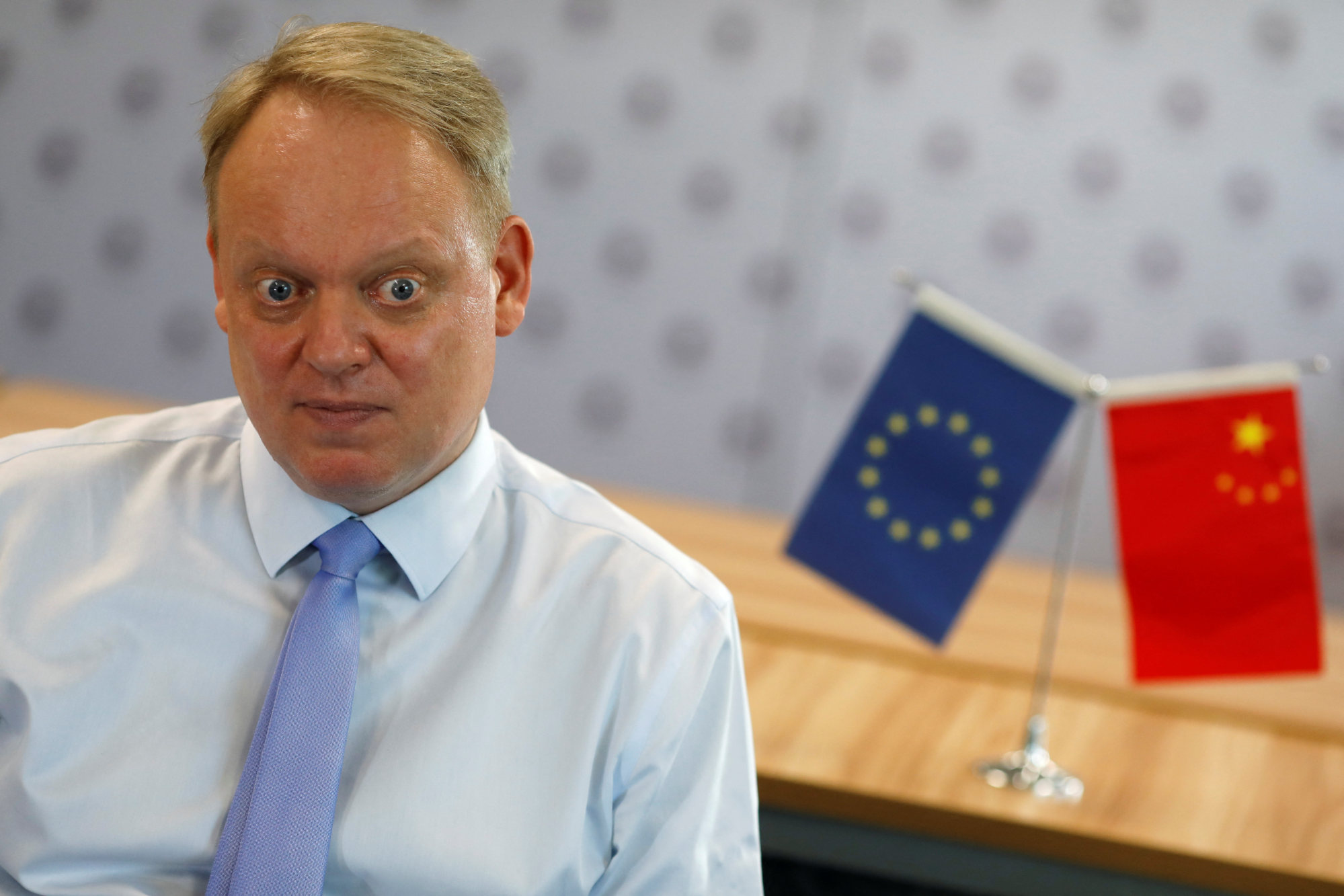The European Union’s imports from the Chinese region of Xinjiang surged in the first two months of the year, even as the bloc moved to finalise two laws aimed at tackling human rights complaints there.
Exports from Xinjiang Uygur autonomous region to the EU’s 27 members rose 217.8 per cent in January and February compared with the same period last year, according to the Post’s calculations based on new Chinese trade data released on Wednesday.
While the total value of those shipments – US$312 million – was small in the grand scheme of things, it represented a huge increase on just US$98 million a year prior.
Do you have questions about the biggest topics and trends from around the world? Get the answers with SCMP Knowledge, our new platform of curated content with explainers, FAQs, analyses and infographics brought to you by our award-winning team.
The biggest buyers of goods from Xinjiang were in Poland, Belgium and the Netherlands.
The most popular goods were lithium-ion batteries, tomato paste and miscellaneous low-value goods that fall below the threshold for customs duties, according to Chinese customs data.
The statistics emerge as Brussels puts the finishing touches on a ban targeting goods made using forced labour. While the ban does not name China, it was written with Xinjiang in mind.
Also in its final stages is a new law requiring EU businesses of a certain size to routinely audit their supply chains for human rights and environmental abuses.
Observers have said the law will be tricky for businesses operating in Xinjiang to comply with as independent audits are thought to be impossible to attain in the region.
EU passes recycling and rights laws that may sharply affect trade with China
China has been accused of operating a systemic campaign of forced labour in Xinjiang, where the UN’s top human rights body said it might have committed “crimes against humanity”.
Beijing has repeatedly denied all allegations of human rights abuses in Xinjiang.
Broadly, the data showed a 4.1 per cent dip in overall EU-China trade.
China’s imports from the EU fell by 9.4 per cent over the first two months of the year, for which Beijing traditionally combines official data, while Chinese imports to the union slipped by 1.3 per cent.

Significant declines came in the shipments of goods that have drawn political attention in Europe over the alleged prevalence of state subsidies in China’s industrial sector.
Among these, electric vehicle shipments tumbled by 32 per cent to US$1.98 billion over the two-month period, while exports of solar photovoltaic cells from China plummeted by 54.3 per cent to US$1.73 billion, according to calculations.
The EU has railed against what it sees as a flood of imports of these products. It believes the products create unfair competition in Europe for local operators.
The bloc is proceeding with an investigation into subsidies in the EV sector, although this month it introduced a requirement that such products made in China must be registered with customs authorities in the EU so that it can apply retroactive tariffs.
EU fails to pass supply chain law that would require audits on Chinese firms
The registration requirement can be viewed as a way to deter imports, which the EU says are “massive”, and were 11 per cent higher between October and January compared with before the launch of the investigation.
Brussels last month launched an investigation into China’s state-owned train manufacturer CRRC in the first use of its foreign-state subsidies regulation.
The European Commission said it was looking at CRRC unit Qingdao Sifang Locomotive over its bid for a contract to provide electric trains to the Bulgarian government.
More probes loom. An investigation into unreciprocated market access in China’s medical devices sector is expected to be launched in the coming period.
No urgent EU help for European solar industry to fight cheap China imports
The head of the EU’s chamber of commerce in Beijing on Wednesday likened the trade tensions to observing a “slow-motion train accident”.
“Something will need to change because Europe cannot just accept that strategically viable industries constituting the European industrial base are being priced out of the market,” said Jens Eskelund.
“It is hard for me to imagine that Europe will sit by quietly and witness the accelerated deindustrialisation of Europe because of the externalisation of low domestic demand in China,” he added.
“In terms of alleviating some of this pressure, there needs to be perhaps a little bit more focus on the demand side in China to create that demand that will make China less of a perceived threat.”
More from South China Morning Post:
- China EV exports, slammed by West’s trade barriers, find greener pastures with free-trade partners
- US panel urges State Department to raise travel advisory for Xinjiang to highest level
- China urges EU cooperation over ‘bloc confrontation’ in bid to warm relations
- Chinese EVs stalled by US, EU import controls as analysts warn this is ‘just the beginning’
- BASF to divest from two China joint ventures over allegations of Xinjiang human rights abuses
For the latest news from the South China Morning Post download our mobile app. Copyright 2024.





